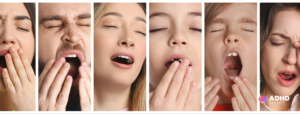The latest episode of the Timeless Women Podcast welcomed Rizwana Dudhia from ADHD Certify for a conversation that cut straight to the heart of how ADHD, hormones and trauma intersect. Hosted by the inimitable Colette Cooper, the discussion explored the nuances of living with ADHD, particularly for women, and how biology and life experiences shape the condition.
You can listen to the full episode, “Rizwana Dudhia from ADHD Certify”, from the Timeless Women Podcast with Colette Cooper.
Below is what the episode covers:
- The lingering stigma: ADHD as a “naughty little boy” stereotype
- How ADHD presents differently in women
- Hormonal shifts and their impact on symptoms (menstrual cycle, perimenopause, menopause)
- The role of diet, nutrition, and supplements (sugar spikes, magnesium, omega-3s)
- Medication as short-term support vs. therapy and structure for long-term success
- Alternative ADHD tools: mindfulness, sleep, routine, coaching
- Trauma’s overlap with ADHD and the diagnostic grey zone
- ADHD comorbidities and challenges of late diagnosis
Rizwana Dudhia on ADHD in Women
One of the first points Rizwana raised was just how often women are overlooked when it comes to ADHD. Symptoms may not always present in the stereotypical “hyperactive” way, making them easier to miss or dismiss.
As Rizwana Dudhia put it:
“With women, ADHD often hides behind inattentiveness or emotional dysregulation. They may not be bouncing off the walls, but they’re still fighting an internal battle every day.”
That invisibility often means women reach adulthood before even considering ADHD as an explanation for their struggles. By the time they arrive at diagnosis, years of misunderstanding and self-criticism have already taken their toll.
Hormones and ADHD: When Biology Amplifies the Noise
The podcast also shed light on a subject rarely spoken about openly: the hormonal impact on ADHD symptoms.
Rizwana Dudhia explained how fluctuations across the menstrual cycle can significantly alter how ADHD feels day to day.
“When oestrogen dips, particularly around menstruation, ADHD symptoms can feel sharper, concentration becomes harder, emotions feel heavier. Many women don’t realise their cycle is amplifying their ADHD until they track the pattern.” – Rizwana Dudhia on Timeless Women Podcast.
This biological rhythm can make daily life unpredictable, with women sometimes doubting their progress or blaming themselves for inconsistency. Recognising the role of hormones reframes those challenges, not as personal failings, but as part of the condition’s complexity.
Trauma and ADHD: A Tangled Web
Perhaps the most thought-provoking section of the episode was Riz’s exploration of how trauma overlaps with ADHD. The similarities in symptoms, such as poor concentration, restlessness, emotional swings, can blur the lines, making diagnosis and support more difficult.
“Trauma can look exactly like ADHD. If symptoms appear after a traumatic event, you have to ask whether it’s ADHD or the brain protecting itself. But if the traits were always there, trauma may just be amplifying them.”
This grey area, as Rizwana described, requires careful attention.
Children in particular may not always have the words to express what they’ve lived through, leaving parents and professionals to untangle whether behaviour is ADHD-related, trauma-related, or both.
“It’s never black and white,” Rizwana noted. “Sometimes medication helps with focus and organisation, but if trauma is the root, therapy may be just as important. Every individual is different.”
Why Conversations Like This Matter
Throughout the episode, Colette Cooper guided the discussion with empathy and curiosity, giving Rizwana space to discuss these layered topics in a way that felt both practical and deeply human.
It wasn’t about medical jargon, but about lived realities: what it feels like to move through the world with ADHD, how hormones and trauma shape that journey, and why awareness matters.
For ADHD Certify, this conversation wasn’t simply about diagnosis, but about perspective. The podcast reinforced the organisation’s role in broadening understanding and offering support that looks at the whole picture, not just a checklist of symptoms.
As Rizwana summed up towards the end:
“Anyone experiencing these challenges deserves the right help, whether that’s through ADHD support, addressing trauma, or both. The key is recognising what’s really happening, and making sure people don’t feel alone in it.”
Listen to the Full Conversation
The full episode of Timeless Women Podcast with Colette Cooper and Rizwana Dudhia from ADHD Certify is available to stream now. It’s a powerful listen for anyone curious about the intersections of ADHD, hormones and trauma, and a reminder of why the conversation around women and ADHD must continue to grow.
If you’d like to learn more about how ADHD Certify can support you, including professional ADHD assessment and guidance, visit ADHD Certify.

Emma Harrington
Author
Emma Harrington is a passionate writer and content contributor for ADHD Certify. With a background in English and family care, she brings clarity and compassion to everything she writes. Emma’s personal connection to ADHD, as a parent of two children diagnosed with the condition, fuels her mission to empower others with clear, supportive, and accessible content. She is dedicated to demystifying ADHD for individuals and families seeking understanding and guidance. Outside of writing, Emma enjoys hiking with her family and practising mindfulness meditation.
All qualifications and professional experience mentioned above are genuine and verified by our editorial team. To respect the author's privacy, a pseudonym and image likeness are used.




